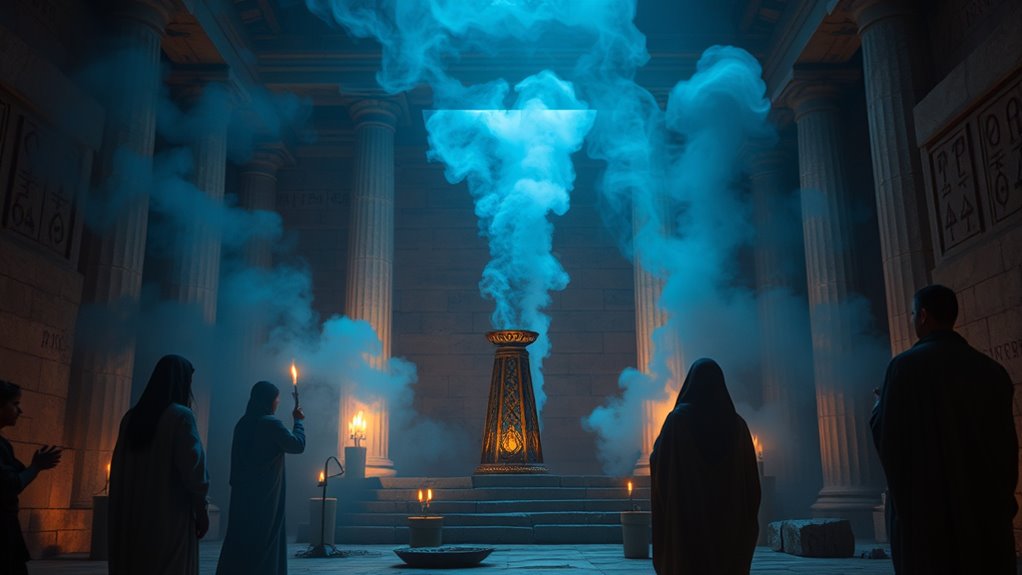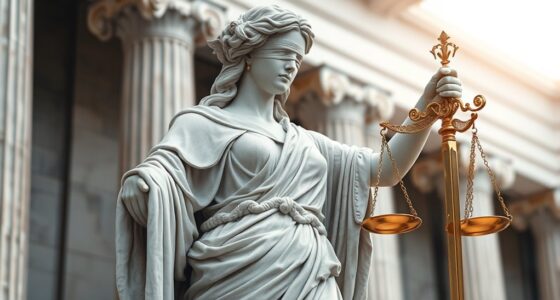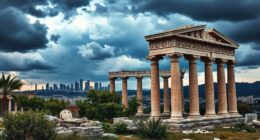At the Oracle of Delphi, sacred fumes from a chasm helped induce prophetic trance states in the Pythia, blending natural gases like ethylene with ritual practices. These rituals, including offerings and purification rites, weren’t just spiritual—they served political purposes, influencing decisions on wars and alliances. The oracle’s messages held immense power, shaping Greek history and authority. If you want to discover how this unique mix of fumes, rituals, and politics truly interconnected, there’s more to uncover.
Key Takeaways
- Sacred fumes, likely ethylene gases, induced trance states in the Pythia, enabling prophetic visions crucial to Greek decision-making.
- Ritual practices included offerings and purification rites that reinforced the oracle’s spiritual authority and political influence.
- The Pythia’s pronouncements guided major political decisions, wars, and alliances, intertwining religion with governance.
- Priests interpreted the oracle’s words to serve specific political interests, making rituals a strategic tool for power.
- The entire process combined natural phenomena, sacred rituals, and political motives, solidifying Delphi’s role as a spiritual and political hub.

Have you ever wondered how ancient civilizations sought guidance from the divine? The Oracle of Delphi was at the heart of this quest, acting as a spiritual bridge between mortals and the gods. The Pythia, the priestess who served as the oracle, would enter a trance state believed to be induced by inhaling sacred fumes rising from a chasm beneath the temple. These fumes, possibly from ethylene or other natural gases, played a vital role in her prophetic visions. As you imagine this process, it’s clear that the rituals surrounding the oracle weren’t just spiritual acts—they were deeply embedded in the political landscape of Greece. Many rulers and city-states relied heavily on the oracle’s pronouncements to legitimize their decisions, wars, and alliances. These pagan rituals, which might seem mystical or arcane today, were powerful tools for shaping political narratives. Leaders would send envoys to consult the oracle before taking major actions, and her responses could sway entire policies, sometimes leading to wars or peace treaties. The influence of these rituals extended beyond religion; they became a form of political currency. The Pythia’s trance, believed to be divine inspiration, was often carefully orchestrated, with priests guiding her and interpreting her words to fit the needs of powerful patrons. This blend of spiritual and political influence made the oracle a central figure in Greek society, commanding respect and fear. The rituals involved in these ceremonies often included offerings, prayers, and purification rites, all intended to purify the participants and invoke the favor of the gods. Yet, beneath the spiritual façade, the process was also a carefully managed political event. The priests and priestesses knew that their words could alter the course of history and often tailored their messages to serve the interests of the most influential factions. In this way, pagan rituals at Delphi weren’t just about seeking divine guidance—they were about maintaining and wielding political power. The oracle’s pronouncements could rally armies, influence treaties, or even sway public opinion. The intertwining of these rituals with politics created a complex system where spirituality and power were inseparable. To understand the Oracle of Delphi is to recognize how deeply religion, ritual, and politics were intertwined in ancient Greece, all centered around the mystical fumes and sacred ceremonies that made the oracle’s voice so compelling and influential. Additionally, the gas emissions from beneath the temple might have contained other elements that contributed to her trance state, further emphasizing the complex interplay of natural phenomena and ritual.
Frequently Asked Questions
What Specific Plants Were Used to Induce the Prophetic Fumes?
You’re curious about the plants used to produce prophetic fumes. In ancient botany and fume pharmacology, sacred plants like laurel, oak, and possibly wild thyme were burned to create the trance-inducing vapors. These fumes, likely a mixture of natural compounds, were believed to facilitate divine communication. While exact species remain uncertain, these plants played an essential role in the ritualistic practices that fueled the Oracle’s visions.
How Did Political Power Influence the Oracle’s Predictions?
Ever wonder if the Oracle’s predictions were just political manipulation? You’d be right. Royal influence heavily swayed her prophecies, turning her into a pawn in power struggles. Leaders used her as a tool to legitimize decisions, making her predictions more about political gain than divine insight. The oracle’s words often echoed the ambitions of those in charge, proving that politics and prophecy blended seamlessly at Delphi.
Were There Any Documented Cases of Deliberate Deception by the Pythia?
You might wonder if the Pythia ever intentionally deceived callers. While superstition fueled belief in her divine insights, skeptics argue some predictions could have been manipulated for political gain or personal motives. Authenticity remained debated, blending science and faith. Though documented cases are scarce, the tension between superstition and skepticism suggests that some predictions may have been influenced, intentionally or not, blurring the line between genuine prophecy and deception.
How Did the Rituals Evolve Over the Centuries at Delphi?
You see, over centuries, the ancient ceremony at Delphi underwent a ritual transformation. Initially, simple offerings and prayers gave way to elaborate rituals involving incense, sacred fumes, and complex ceremonies. As political influence grew, these rituals integrated more elaborate elements, blending spirituality with statecraft. This evolution reflects how the Delphi oracle adapted, maintaining its significance through changing cultural and political landscapes, becoming more intricate while preserving core ritual elements.
What Role Did the Oracle Play in Major Greek Military Decisions?
Imagine, during vital battles, you’re relying on an oracle whose words influence ancient diplomacy and shape mythic symbolism. You realize her prophetic insights often guided Greek military decisions, making her a pivotal figure in forging alliances and determining fate. Her role transcended mere prophecy; she embodied divine authority, intertwining spiritual and political worlds, and ensuring her guidance was sought before pivotal moments that defined Greek history.
Conclusion
So, next time you think about the Oracle of Delphi, remember it wasn’t just about ancient fumes or mystical rituals. It was a complex mix of politics, power, and human belief—kind of like how social media influencers shape today’s trends. Delphi’s prophecy game was a high-stakes mix of faith and strategy, with a dash of ancient flair. It’s a reminder that even in history, people sought meaning, just like we do with our latest TikTok or tweet.









